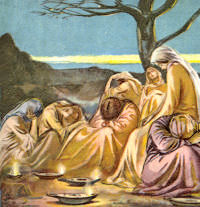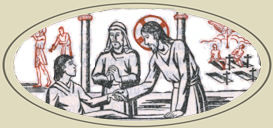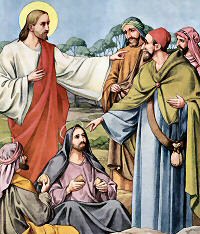» Enjoy our Liturgical Seasons series of e-books!
While they went off to buy it, the bridegroom came and those who were ready went into the wedding feast with him. Then the door was locked. Afterwards the other virgins came and said, ‘Lord, Lord, open the door for us!’ But he said in reply, ‘Amen, I say to you, I do not know you.’ Therefore, stay awake, for you know neither the day nor the hour (Matt 25:10-13).
This year, in the current circumstances due to the “Covid-19” pandemic, the Plenary Indulgences for the deceased faithful will be extended throughout the entire month of November, with an adaptation of works and conditions to guarantee the safety of the faithful.
Click here for commentary on the readings in the 1962 Missal of the Roman Rite.
Sunday Readings
The first reading is taken from the Book of Wisdom 6:12-16 and cites watchfulness as the key to a faithful religion and understanding of wisdom.
The second reading is from the first Letter of St. Paul to the Thessalonians 4:13-18 where he addresses a practical and doctrinal problem faced by the community. Paul had preached to them and left them with the impression that the second coming of Christ was imminent. Some died before the paruosia and their concern is what has happened to them. Paul states firmly and categorically that what matters is that they interpret these events because of their faith and hope in the Lord.
The Gospel is from St. Matthew 25:1-13. Although commentators and writers have found difficulty in explaining many of the details in this parable, the general lesson is clear enough. Our Lord described an incident that happened or could have happened at a wedding festival in order to bring home to his listeners the need for being ever vigilant and ready in his service if they wish to avoid the calamity of being excluded from the heavenly and eternal nuptials on the last day. In the other parable in which our Lord uses a wedding feast to describe his kingdom, the lesson concerns those who refused the invitation and will not come to the wedding. Here it concerns those who gladly accepted the invitation.
The ten bridesmaids, or maidens, in the parable represent all Christians. On receiving the sacrament of baptism, the Christian starts on the road to heaven; he gets his invitation to the heavenly nuptials but this is only the beginning. From the moment he comes to the use of reason he is expected to prepare himself, by living according to the law of God, for the great moment when the call will go forth: Behold the bridegroom! Come to meet him. This moment will be, first, at the hour of death for each individual when each one's eternal fate will be decided, and again at the general judgment of the human race. During their lifetime all are invited to the heavenly wedding, and all have the necessary means to get ready. But, like the foolish bridesmaids, many will fail to make use of these means and will realize their folly when it is too late. Sad, but true.
 A certain number of those for whom Christ died on the cross, and to whom he gave the gift of his revelation and offered all the helps they needed, will never reach heaven because they exchanged their heavenly birthright for a mess of earthly pottage. That the foolish bridesmaids in the parable lost a golden opportunity through their negligence is evident and we can all sympathize with them up to a point, but the thoughts of very few will turn to the bride and groom who were so seriously insulted by this act of negligence on the part of chosen friends.
A certain number of those for whom Christ died on the cross, and to whom he gave the gift of his revelation and offered all the helps they needed, will never reach heaven because they exchanged their heavenly birthright for a mess of earthly pottage. That the foolish bridesmaids in the parable lost a golden opportunity through their negligence is evident and we can all sympathize with them up to a point, but the thoughts of very few will turn to the bride and groom who were so seriously insulted by this act of negligence on the part of chosen friends.
So too, every Christian lost is a grievous insult to the God who created and redeemed him. Christians have received the fullness of God's revelation, and have been offered a special place in his marriage festival; they have received a privileged invitation not given to others. Is it not a serious and deliberate insult to God not to comply with the conditions of that generous offer?
Providing themselves with oil was the obligation imposed on the bridesmaids in the parable. It was surely a trivial condition when compared with the reward offered them: a very special place at the marriage feast. The obligations imposed on us Christians are surely trivial too when compared with the reward offered us in return: an eternity of happiness in heaven. It seems incredible that there are many among us this very day who, like the foolish bridesmaids, doze and sleep contentedly holding empty lamps in their hands, while at any moment they may be awakened by: Behold, the bridegroom comes! Go forth to meet him. It will be too late then to do anything; even their best friends cannot help them. Each one must stand before the judge just as he is: there can be no borrowing of the oil of merit from others and there will be no time to buy any.
Now is the time for all of us to say "Lord, Lord, open to us." open to us the doors of your mercy and kindness. Open to us the eyes of our understanding that we may see our defects and remedy them while there is yet time.
It is up to us now to decide, aided by God's grace, where we shall be found on the last day—with the wise bridesmaids or with the foolish.
—Excerpted from The Sunday Readings by Fr. Kevin O'Sullivan, O.F.M.
 Commentary on the Readings for the Twenty-Third Sunday after Pentecost
Commentary on the Readings for the Twenty-Third Sunday after Pentecost
"When Jesus came to the ruler's house, and saw the flute players and the crowd making a din, He said, 'Begone, the girl is asleep, not dead.' And they laughed Him to scorn. But when the crowd had been put out, He went in and took her by the hand; and the girl arose" (Gospel).
Notice the small flute-playing figures at the left. They represent the crowd of people who laugh their Creator to scorn.
Yet how often we move among them, enjoying what we call "life," even though we may be spiritually dead.
The trumpet-blowing angel at the right, summoning the dead to life, represents how Jesus, after the crowd has been put out by us, raises His Hand over us in absolution, extends His Hand to us in Holy Communion.
St. Paul, too, warns us against these ;enemies of the cross of Christ whose end is ruin, whose god is the belly."
—Excerpted from My Sunday Missal, Confraternity of the Precious Blood






